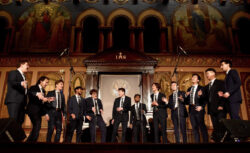At the start of his first year at Georgetown, when most other freshmen were busy partying and meeting new people, Justin Pinn (COL ’13) wasn’t trying to make friends or socialize. Worried that he would fall behind in his schoolwork, he spent most weekends in his room studying furiously for his classes.
Pinn is not anti-social—he was anxious about succeeding in college. A student from a rural Ohio town, he is the first person in his family ever to attend college. When he got here, he didn’t know how he would handle the workload at a school like Georgetown.
“I had no idea what to expect,” Pinn said. “It was a tough transition.”
About eight percent of this year’s freshman class, approximately 120 students, are first-generation college students. They come from families and, in some cases, communities where attending college is the exception, not the norm. These students often face a wide range of challenges before and during their time at Georgetown. Socially, academically, and financially, they face obstacles that the 89 percent of Georgetown undergraduates who have a parent with a bachelor’s degree are less likely to encounter.
The neighborhoods they hail from often do not resemble Georgetown or Washington, D.C. at all. To Pinn, Georgetown was a foreign place socially, and most of his peers came from a totally different socioeconomic class. Victor Fefelov (COL ’13) experienced a similar culture shock.
“I come from a small village in the middle of Alaska,” Fefelov said. “This is different. … I’ve been amazed at just about every aspect of Georgetown.”
Because the difference between their backgrounds and their peers’ can be so vast, Georgetown offers several programs on campus designed to help first-generation students transition to college. Chief among them is the Center for Multicultural Equity and Access’s Community Scholars Program, which does everything from assisting students with financial aid to helping them adjust to the Georgetown community and succeed academically.
Charlene Brown-McKenzie, director of the CMEA’s Meyers Institute for College Preparation, a program designed to encourage D.C. Public School students to go to college, said that introducing first-generation students to academic life before they arrive at Georgetown or even enroll helps them get acclimated to academic life here. According to Brown-McKenzie, it has also been shown to increase graduation rates.
So each year, CSP invites about 60 incoming freshman to come to campus before the school year begins for a series of seminars and classes that prepare them for their college experience. They have sessions with financial aid officers, a non-credit seminar that prepares students for courses like Accounting, Economics, Biology, or Theology, and a program designed to help students write at a collegiate level that continues into the fall semester as a part of the first-year English requirement.
Georgetown offers these programs in part because first-generation students often come from high schools that don’t adequately prepare them for the workload of a school like Georgetown.
“We know there are limits to what public schools can offer,” Professor Elizabeth Velez, the director of CSP, said. “We have quite a few students who do pre-med. They come from schools that don’t offer [Advanced Placement] Biology. If you have not taken an AP Biology class, Biology is definitely going to be a challenge for you.”
Vanessa Correa, the assistant director of CMEA, said that most first-generation students at Georgetown come from either very large urban schools or very small rural schools and make the most of those schools’ scarce resources.
“If their school only has three AP classes, they take all three,” she explained. “If their school doesn’t offer AP classes, they take all honors classes.”
Since schools like these often have limited or overtaxed college counseling services, and their parents may not have an intimate knowledge of the application process, getting accepted is more difficult for first-generation students, too. Their peers may have taken the PSAT or SAT prep courses, but these students typically study for their standardized tests and apply to Georgetown independently.
Students who participated in Community Scholars largely agree that the program has been helpful to them—particularly because some of them were very nervous about making the transition to college life.
“I was expecting to be working non-stop,” Community Scholar Jaclyn Wright (COL ’12) said. “I was really worried how I was going to stack up.”
Gianfranco Nuchese (COL ’14), another Community Scholar, agreed. “The workload [at Georgetown] has multiplied.”
And although the program is designed to help students adjust academically, Community Scholars students say that meeting others who’d had similar experiences in high school and were transitioning to a new culture as they were was helpful.
“The program allowed me to build a bond with students who have become like family to me, and that is a critical component to coming to a school,” Pinn said. “My suite-mate is a fellow Scholar and I regularly eat with my Scholar friends. We are family, and I know when we leave Georgetown we will stay family.”
***
The biggest obstacle for many first-generation students isn’t related to academics or culture—it’s money.
“There are students who have overcome huge obstacles to come to Georgetown.” Velez said. “We have kids who are figuring out how to send money from their work-studies back home to feed their families. Money is this constant issue.”
Even if students receive a federal scholarship like a Pell Grant or a Perkins Loan, navigating the complicated bureaucracy that delivers the money can be confusing.
“It became really difficult. Where am I going to get money to pay for my books, how am I going to access the scholarship money I’ve received from outside sources?” Johnny Solis (COL ’11) said. “There are many different layers.”
Wright added that making sure she has enough money for school is incredibly time consuming.
Finding money to pay for any college is difficult, but at Georgetown, one of the most expensive schools in the country, it becomes even harder. The College Board estimates that the cost of attending Georgetown this year is over $56,000—more than the median family income in the United States.
Compounding the challenge of navigating the loan and scholarship system is the fact that Georgetown students have typically received relatively little federal money. In the fall of 2001, the most recent year for which statistics are available, 22.6 percent of undergraduates nationwide received Pell Grants, federal grants that the U.S. Department of Education gives to students from low-income families. But at Georgetown, only 691 students received Pell Grants that year, roughly 10 percent of its undergraduate population.
The high cost of attending Georgetown combined with the insufficient aid packages has stopped many qualified but underprivileged applicants from attending. Schools with bigger endowments are able to offer better aid packages, which may make Georgetown a much less attractive option.
“It’s not that the students we’re admitting are getting into better schools, it’s just that we’re not making it affordable enough for them,” Melissa Foy, director of the Georgetown Scholarship Program, said. “The kids that we really want to come here sometimes don’t have the opportunity to choose us [because of tuition and other costs].”
The issue of money can involve more than just paying for school tuition. When his grandmother died a month into his first year at school, Solis flew back home to Texas to attend the funeral. Three months later, his cousin and the deacon of his church passed away as well, but he didn’t have the money to go home again.
“As much as I wanted to go back home, I couldn’t afford it,” he said.
By 2004, Foy said, Dean of Admissions Charles Deacon and several other administrators could see that Georgetown was becoming a place that was only accessible to those who could pay to attend. Later that year, the Office of Undergraduate Admissions started the Georgetown Scholarship Program, a “merit within need” scholarship which gives aid to students with exceptional applications and financial need.
“To be competitive with our peer institutions we need to be offering the kind of aid that other schools are offering so that students who really want to come here will be able to come here,” Dean of the College Chester Gillis said.
Georgetown expanded the program in 2009 when it founded the 1789 Scholarship Imperative. The University’s goal is to provide 1,789 students with annual $25,000 scholarships and raise $500 million in funds by 2014.
Partially thanks to the success of GSP-hosted alumni events, the program has been enormously successful in its first year. In previous years, GSP would award around 70 scholarships; this year, it gave out over 150.
A major factor in the program’s success has been GSP’s efforts to connect donors with the students who benefit from their contributions at lunches, meet-ups, and parties. Donors are often eager to help students however they can. One family picked a first-year student up at the airport when he arrived in D.C.; another invited all 150 GSP scholarship recipients to her house for Thanksgiving.
“One donor last year gave me $300 to buy a suit,” Solis said.
Though the 1789 Initiative is still in its first year, Foy says Georgetown is already ahead of its peer institutions in creating a program that focuses on building bonds between students and donors.
“Georgetown is pioneering this idea of connecting students to alumni,” she said. “No college campus is doing this to the extent that we are right now.”
Students like Solis, who would not have been able to attend Georgetown without a GSP scholarship, are grateful for the opportunity to be here. For him, college is just as much about helping his family as it is improving his own career prospects.
“A lot of our family members look to me because I’m the one who is in college. I’m the one who’s getting an education, so they look to me as this kind of educational leader,” he said. “There’s this responsibility put on your shoulders. Not only is there this pressure to do well to survive, but there’s pressure to do exceptionally well.”
It seems that Georgetown programs like Community Scholars and GSP do a good job of helping students like Solis deal with that pressure and succeed at Georgetown.
“I will always be proud of Georgetown, because I could not have experienced any of this without CMEA and CSP being so supportive of me,” he said. “I come from a community where everyone knows I’m the first-generation college student. It’s not a burden, it’s just this whole new layer to live up to. … I have to work hard for my family.”







Great article – really interesting read. I’m shocked no one has commented on it yet. As a young alum/grad student it makes me sad that I can’t help these kids out besides my very very minimal annual donation, but someday I hope I will be able to because everyone deserves a chance to enjoy Georgetown like I did.
08 Alum – what a great comment! Thank you for supporting scholarship at Georgetown. It may seem small to YOU but together, it makes a huge difference! I am so grateful to you. If you’d like to get more involved with GSP, please email me at foym@georgetown.edu. You can serve as a mentor to a GSP student, if you’re interested! Hoya Saxa. Thank you for supporting some very deserving students.
Nice post buddy